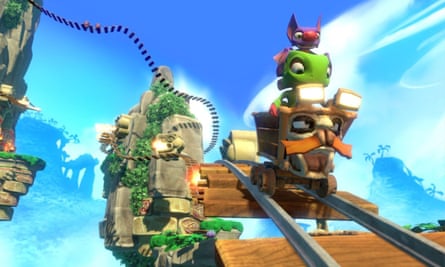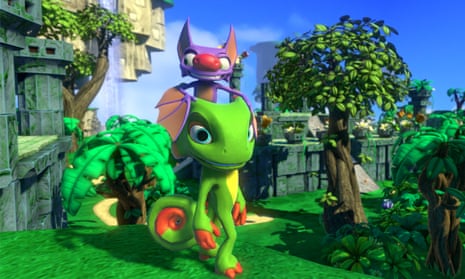Don’t be fooled by the saccharine paint job, the goggle-eyed supporting cast of anthropomorphic chestnuts, clouds and refrigerators, or the ear-niggling lullaby melodies: Yooka-Laylee is a game meticulously crafted, not for children, but for the middle-aged.
Its nostalgia is plainspoken and precise: the game is a paean to 1997, a time when Nintendo, in conjunction with its former life-partner, the British games company Rare, was busily establishing the rules, boundaries and aesthetic of platform games on the Nintendo 64, the company’s first fully 3D-capable machine.
Yooka-Laylee is not so much a love letter to Super Mario 64, Conker’s Bad Fur Day and Banjo-Kazooie (both games share a piggy-backing pair of protagonists and a certain double-barrelled poetry, with those trailing vowels) as a full exhumation of the late 90s platformer.
For the ex-Rare staff that worked on the game, it’s a way to return to a golden era, before the company ran off with Microsoft with its deep pockets and empty soul. For the 30-something players who backed Yooka-Laylee on Kickstarter to the soaring tune of £2m, it’s a way to return to a time when the platform game was the medium’s dominant form for creative expression and invention. A way too, perhaps, to recapture some of the wide-eyed wonder of when video games had broken into a new dimension, when anything seemed possible, when we still had our youth.

It’s all here: the pea-green hills, the glittering rivers, the ice world, the well-maintained tombs, the unambiguously evil bad guys, the agonising puns, the endless trail of bobbing collectibles, the oh-so-daft premise.
The Trumpian business maven Capital B and his put upon assistant Dr. Quack – a mallard suspended in a jar - have built a factory into which they intend to funnel all the world’s literature, and rather courageously, considering the state of modern book publishing, turn it into profit. Yooka, a spritely chameleon, and Laylee, a flapping bat are having none of it (they are massive Tolstoy fans, presumably) and scour a half dozen or so Grand Tomes or “worlds” in Super Mario parlance, in search of Pagies, loose leaves that have escaped Capital B’s nefarious recycling centre.
Pagies also hold the key to unlocking the game. When you first arrive in a Grand Tome, certain pathways trail off, bridges stop midway across a ravine, and buildings miss entire wings. Once you’ve collected a sufficient number of Pagies, you can extend the Grand Tome, opening up new areas, routes and diversions in which yet more Pagies can be harvested.
In this way, progression is synched with collection. Knowledge too, as to reach the next world you must successfully complete a quiz filled with questions not only about the characters you met and the places you’ve visited, but also the choices that you’ve made while playing the game until that point.
Pagies, on the whole, are not found just merely laying about the place. Rather, they are distributed as rewards for completing tasks in each world. You might have to light a series of torches in the correct order to solve an anagram, or race an anthropomorphic cloud around a track that weaves through the environment. You might have to salve a parched air vent by spitting a stream of water from your mouth, or smash the teeth of an enraged cave boss, who has mistaken Yooka and Laylee for a pair of double-glazing salespeople.

Unlike most contemporary games, there are no mission markers driving you from one objective to the next. Rather, these mini-quests are scattered throughout the world, seemingly one every few metres, and you can take them on in whatever order you prefer. The absence of handholding (miss a vital clue and you may be at a loss for what any of the scores of non-player characters need you to do for them) is deliberate, designed to appeal to those players who yearn for a time when games were more often playpens for loose discovery, rather than explicit, ordered to-do lists. The trick works: the richness of each Grand Tome is revelatory - geographical width is sacrificed for interactive variety and depth - and unfurls in a delightful way. As you progress deeper into the game, you unlock new moves and abilities in new worlds that then unlock new pathways and routes in old ones.
Not everything is well explained. For example, your health bar is represented by butterflies. To replenish your health you must consume butterflies, which are dropped, delightfully, by defeated grunts or simply found fluttering around bushes. Run into the insect and it will disappear in a shower of particles, which you might suppose has restored your health. In fact, you must eat the creature with a flicked tongue to consume its benefits. Knocking into a butterfly merely shoos it away. There are dozens of examples like this, where systems aren’t adequately explained, or where the instructions aren’t effectively reinforced either by text or visual effects.
Miss the optional conversation that explains how to switch to first-person perspective and you may miss how to line up those projectile shots, fired from Yooka’s mouth, which are crucial for unlocking numerous Pagies. The line between bothering players with over-explication and bewildering them with freedom is thin and moveable between individuals. Arguably Yooka-Laylee invests too much faith in its players, and not enough effort in its user-interface. Still, it’s perhaps churlish to criticise the game for cleaving to the sometimes unfashionably punitive designs of those 20-year-old games it celebrates and impersonates. And for every time you grow frustrated at a punishing boss fight, there is a vast plethora of diversions with which to restore calm and interest.
For a game part-funded on Kickstarter Yooka-Laylee feels atypically textured and ideas-rich. There’s care and finesse – the way that the exquisite soundtrack seamlessly changes whenever you swim underwater, for example – and a pleasing self-awareness too; the game is littered with quips that acknowledge its archaisms. There are jokes about looking up tips on the internet, about missing key text because you’re busy looking at your phone, or about not having anyone to play local multiplayer games with as everyone is playing online (the world includes a stratospheric arcade machine which can be played when you find the necessary coin).
Pleasingly, the game continues to add ideas and new, often-bonkers, tools over its course: lick a cannonball and you’ll be able to temporarily absorb its power, allowing Yooka to walk steadfastly when faced with a brisk headwind. What the game loses by not having had a Rare/Nintendo-sized QA department to smooth its rough edges it compensates for with a princely pile of ideas, and a lovely control scheme that only improves with elaboration. Younger players may be less willing to forgive its anachronisms but for its target audience, those ageing mourners of a lost fashion in games, it’s a promise that’s proven worthy of backing.
Xbox One (version tested)/PS4/Linux/MacOS/Windows; £28.99; Pegi 7+

Comments (…)
Sign in or create your Guardian account to join the discussion